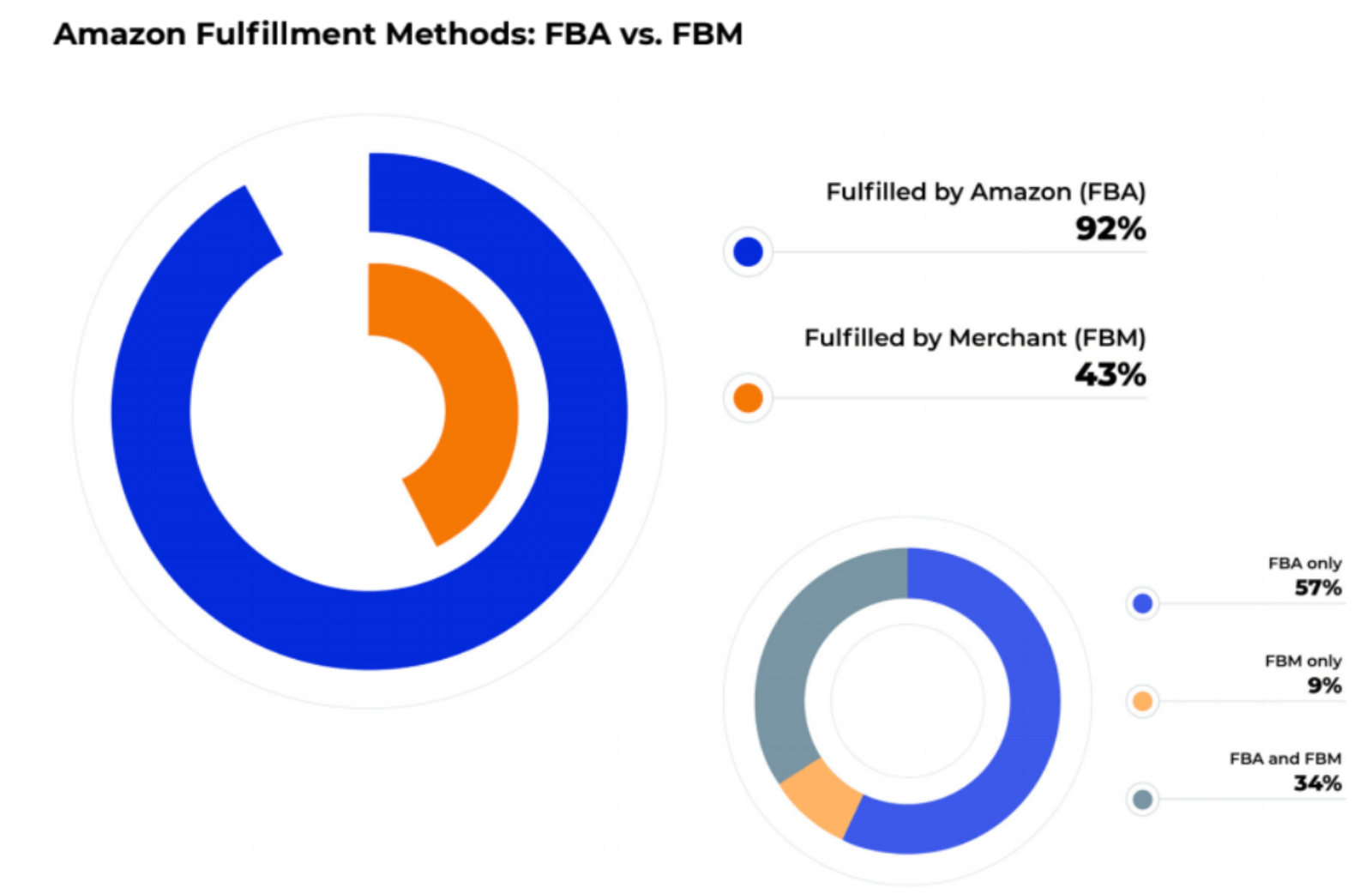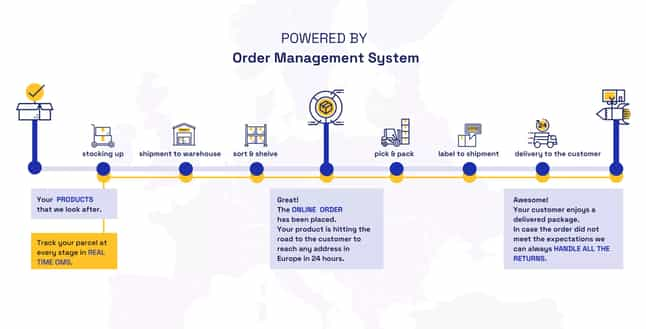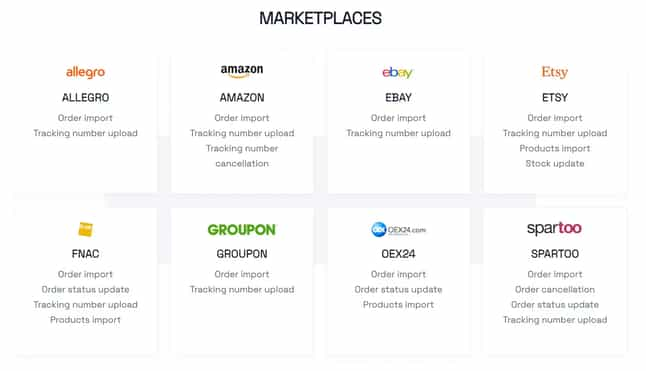In order to answer your request, we are obligated to process the data given above. Sometimes, however, we would like to use them for slightly different purposes, such as statistical data or informing you about our new products and services.We promise that we will use the given information for communication purposes only. We also remind you that you can unsubscribe from our mailing at any time (see Privacy Policy).
Selling on Amazon, as we know from previous posts, is not a simple process; in order to be successful in this competitive marketplace, a number of rules and strict requirements must be adhered to (as described in this article regarding bulletproof guide for Amazon sellers, among others).
However, the world of selling does not end with the visualization of advertisements or offers: Online trading is closely linked to logistics and without it, it is definitely not viable.
In today's post, we will take a closer look at this very issue: we will see which logistics models Amazon itself offers, what their pros and cons are, and whether there is a third way - i.e. relying on third-party fulfillment services.
So here is a complete guide to the pros and cons of FBA, FBM, and external logistics services!
FBA and FBM: find out the difference
Let's start with a definitional take: Amazon encourages its sellers to use its own platform solutions, namely FBA (Fulfillment by Amazon) and FBM (Fulfillment by Merchant).
FBA is, to put it simply, an expensive but also easy approach - in this model, the vendor hands over all the logistics to the marketplace itself, and does not have to worry about storage, packaging, dispatching, or handling returns. If you choose that solution, your products are sent to the Amazon fulfillment center, where dedicated specialists take care of them from start to finish.
FBM, on the other hand, is a system in which all these responsibilities are placed on the back of the merchant himself: he has to find his own warehouse and worry about the further realization of the order in the supply chain after the buyers have finalized the purchase itself on the shopping basket. Thus, it is a decision to take on less cost and potentially less risk - but with the fully conscious addition of a really considerable amount of logistical work and challenges involved.
Which option is more popular with buyers? The data collected by Jungle Scout clearly shows that by far the majority of sellers on Amazon choose FBA, although, interestingly enough, they also quite often combine both models. I won't leave you in the dark, of course - and I will tell you the reasons for this decision in the following paragraphs.

FBA or FBM: choose wisely
Whichever solution you decide on, it is important that you make these decisions consciously and know all the advantages and disadvantages of both.
We come to your logistical rescue - below you will find a compiled compendium of the pros and cons of each of these models.
Benefits and costs of Amazon FBA
Let's start with the advantages - there are several, and undoubtedly some of them are definitely valuable and unique from the point of view of the sellers on this marketplace:
-
once you have opted for FBA, your products automatically join the Prime shipping program, which has the advantage of, among other things, free shipping within 2 working days, improving both the standing of the offer in the eyes of buyers and customer service;
-
the rapid and continuous process of fulfilling the orders (24/7);
-
you don't have to worry about the returns handling - from this time it's an Amazon duty;
-
increased opportunity to win the Buy Box - and consequently better visibility and potentially more frequent sales, enriched with the possibility of getting other marketing features such as Lighting Deal and Deal of the Day.
Sound good? I don't doubt it! The benefits of Amazon are worth consideration. However, putting everything on the line is not a piece of cake; there are also a number of challenges associated with the decision to use FBA, which mean that in certain not-so-rare cases it is not even worth trying:
-
firstly: the price. At FBA, literally, almost nothing is free of charge. You will also have to pay for the costs of packaging, dispatch, and also return handling. Moreover, these financial issues depend on a truly diverse range of factors, such as product weight and dimensions or even product category and its' price; of course, to this, you must also add the costs of so-called optional services, e.g. labeling or disposal;
-
very strict product preparation requirements - regarding at least the correct labeling (necessarily with a visible GTIN/FNSKU code). PLEASE NOTE: Products not meeting these criteria will be ... sent back to the seller at the seller's expense. The absurdity of the situation also lies in the fact that there are cases in which it is more economical to dispose of such goods than to send them back... (the environment and sustainable logistics do not like this);
-
the problem of seasonality: planning a logistical budget with the FBA is not easy. The FBA is linked to seasonal term storage fees, which increase during the so-called high season, i.e. from October to December;

- loss of control - Putting full control in the hands of Amazon is a double-edged weapon and, like any stick, has two ends. You can't just walk into a warehouse and check that everything is working as it should. You have to take my word for it that the goods you have placed in someone else's hands will be well looked after and will not be lost or damaged.
-
Opportunities and obstacles of Amazon FBM
What is a weakness of Amazon FBA is, of course, a strength of the FBM (and vice versa). The key difference between those solutions is the fact, that by choosing Amazon FBM, you have the ability to exercise control over the entire process related to the logistical handling of your order. But what does this mean in practice?
-
significant independence from changes implemented by Amazon - if the marketplace changes its fulfillment policy, it will not affect, for example, the cost of storing your product;
-
customer service is in your hands - if you want to meet the packaging needs of your buyers and offer them personalized parcels, add a free gift to your order, or write a handwritten thank-you note, you do not have to pay extra for all the little things that are so much appreciated by shoppers;
-
you can control the stock in real-time on your own- which is really helpful, especially if you are trading items with limited expiry dates.
In contrast, FBM needs more responsibility on the seller's side which means more work:
-
the need to focus on logistics challenges - these include seeking and negotiating warehousing or courier rates and other shipping costs. In addition, as your Amazon business grows, you will need to hire people to help with packing the products;
-
last, but not least: difficulties in joining the Amazon Prime program - each Amazon seller aspires to receive this badge. However, it is not so easy; to be able to boast this title you must have an on-time delivery rate higher than 99% and an order cancellation rate of less than 0.5%. What's more - you should also offer deliveries at weekends.
Life beyond the platform: FBM outsourced to external logistics specialists
Making the best choice for your online store is not easy. Whether you choose Amazon FBA or FBM - at the end of the day there will always be both advantages and disadvantages.
There is, however, a kind of third option, an alternative to FBA but one that takes the logistical burden off the shoulders of your sales: that is, to use the Linker Cloud Fulfillment Network offering.

To meet the expectations of each of Amazon seller we provide an offer that takes the burden of all logistics off the shoulders of the merchant, on the other hand, there are no hidden costs, it finds the warehouses and suppliers itself, guarantees delivery on time. In a simply words, Linker's offer means:
-
a transparent logistics solution enriched by shipping insurance, free form any hidden costs;
-
lack of commisions on products sold on Amazon;
-
full control over the dispatch goods;
-
free choice of warehouse;
-
simplified returns handling;
-
serving potential customers even in the most difficult sectors - including electronics or oversized dimensions,
-
seamless marketplace integrations allowing for migrating to other platforms easier than ever:

Summing up...
Nowadays you can take full advantage of the best of the Amazon FBA and FBM models. Before making a decision on a particular solution, think about what is better for your business; weigh up the benefits and disadvantages of Amazon solutions. Focus on the high level of customer service and related financial costs.
Make your customers happy with quick shipping and making it easier for them to return is always at a premium - remember that you can put this in the hands of industry specialists who can deal with this subject better than anyone else.
.webp?width=5471&quality=low)

-1.webp)



.webp?quality=low)